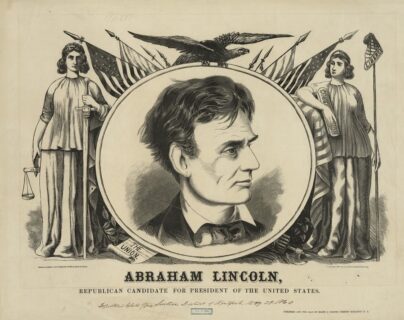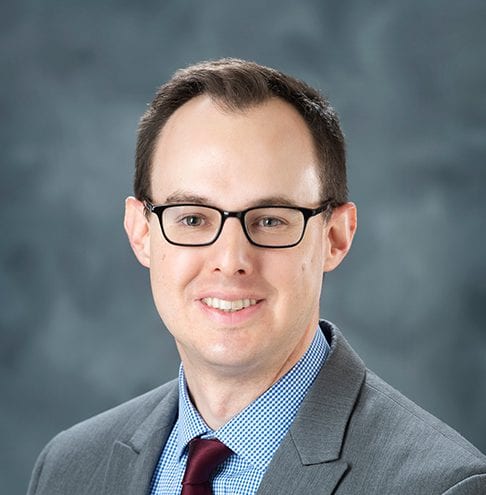
Cooper Union Speech

By: Andrew Lang
In February 1860, Abraham Lincoln delivered the most important speech to that point in his career. Lincoln’s powerful remarks at the Cooper Institute in New York City paved the way toward his receiving the Republican Party’s nomination for the presidency.
Abraham Lincoln earned national acclaim for his debates with Stephen A. Douglas during their 1858 campaign for the United States Senate. Though he did not win the seat, Lincoln continued to challenge Douglas’s doctrine of “popular sovereignty,” which allowed for local citizens to decide for themselves whether to permit slavery’s expansion into the federal territories. As he had done since 1854, Lincoln followed Douglas across the Midwest and exposed the Democrat’s hollow ambivalence on the slavery question. Indifference to the growth of slavery beyond its original limits, Lincoln argued, violated the founding generation’s effort to place the institution on the path of ultimate extinction.
Lincoln’s belief became more urgent by late 1859. A presidential election would take place the next year, testing the durability of a “house divided” between pro and antislavery alliances. In September, Douglas published an essay in Harper’s New Monthly Magazine, “The Dividing Line between Federal and Local Authority,” and delivered speeches on the same subject. Aiming to secure his bid as the Democratic Party’s presidential nominee, Douglas claimed that the Constitution’s framers advocated popular sovereignty to solve the issue of slavery’s expansion. Then, in October, news of John Brown’s raid on Harpers Ferry, Virginia, shook the nation. Slaveholders howled that the Republican Party fueled Brown’s insurrectionary tactics. Even President James Buchanan, a northern Democratic ally of southern slaveholders, condemned antislavery rhetoric as “an incurable disease of the public.” Brown’s violent abolitionist crusade, Buchanan warned, would spark ever “more dangerous outrages and terminate at last in an open war by the North to abolish slavery in the South.”
In this tense national climate, New York Republicans in October invited Lincoln to deliver a speech on the political moment. Scheduled for February 1860, the lecture would take place in the Brooklyn church of famed abolitionist preacher Henry Ward Beecher. Lincoln could not pass up such a golden opportunity. An ambitious presidential hopeful, Lincoln needed to endear himself to the party’s influential northeastern politicos. New York was a key Republican stronghold, led by its favorite son, Senator William H. Seward. Insiders regarded the sterling and experienced Seward a lock on the presidential nomination. How would Lincoln, a lanky, disheveled westerner with a squeaky voice and an odd gait, secure his party’s coveted national blessing?
The confluence of events during the autumn of 1859 provided Lincoln with ample material as he prepared his speech. He spent weeks in the Illinois State Library organizing his refutation of Douglas’s claim that the Founders’ promoted popular sovereignty. Lincoln “was painstaking and thorough in the study of his subject,” recalled his law partner William Herndon. Pouring through congressional records, political history, and Jonathan Elliott’s multi-volume Journal and Debates of the Federal Constitution (1836), Lincoln aimed to prove the framers’ antislavery constitutionalism and their insistence on federal supremacy over the territories.
After months of careful preparation, Lincoln departed for New York. Awaiting him was the biggest political stage of his career. But Lincoln worried that the elite eastern audience would look askance at his homespun western flavor. Herndon agreed: “When at last he left . . . we had many misgivings—and he not a few himself—of his success in the great metropolis.”
On the eve of Lincoln’s speech, the New York organizers, anticipating a large gathering, moved the event from Beecher’s church to the Cooper Institute in Manhattan. On February 27, 1860, spectators filled the auditorium. At first, Lincoln sensed his observers sitting in silent judgment of the tall, awkward specimen, dressed in an ill-fitting suit, standing before them. But upon opening his speech, Lincoln settled into a confident rhythm. He captivated his listeners. Unlike romantic, Victorian-era harangues, the speech “was devoid of all rhetorical imagery, with a marked suppression of the pyrotechnics of stump oratory.” Instead, Lincoln the lawyer spoke to his jury. Appealing to logic and reason, he executed his brief.
At the outset, Lincoln accepted Douglas’s own proposition that “Our fathers, when they framed the Government under which we live, understood this question [the dividing line between federal and local authority] just as well, and even better than we do now.” Lincoln ingeniously upheld Douglas’s premise that the Constitution and history itself offered clear evidence of the framers’ original intent on the territorial question. But with mathematical precision and expert historical analysis, Lincoln advanced his central thesis: “a clear majority” of “our thirty-nine fathers who framed the original Constitution . . . understood that no proper division of local from federal authority, nor any part of the Constitution, forbade the Federal Government to control slavery in the federal territories.”
The address at Cooper Institute is a drama in three acts. First, Lincoln’s skillful grasp of history rebutted Douglas’s charge that the Constitution barred congressional regulation of slavery in the territories. Lincoln had studied the words and deeds of the thirty-nine delegates who signed the Constitution in 1787. He listed them by name and evaluated their congressional legislative actions taken before and after the Constitutional Convention. And he demonstrated that twenty-one of the thirty-nine had cast votes between 1784 and 1820 in favor of Congress’s authority to control, if not restrict, slavery in the territories.
Lincoln anticipated an inevitable rejoinder to his case: why should Americans, living decades after the Constitutional Convention, remain wedded to the precedents of a bygone era, especially if conditions in the present might not reflect those of the past? He acknowledged that no generation is necessarily obligated to bind itself to history. But to reject history itself, to reject rational, objective fact in the service of an immoral political agenda—as Douglas did—deceived a free citizenry and weakened the bonds of self-government. To stand in the face of truth and declare it a fiction shirked “the responsibility” of understanding previous generations as they understood themselves.
Lincoln thus believed that the framers had offered to posterity an ideal model by which to secure liberty and address the place of human bondage in a free republic: “As those fathers marked [slavery], so let it be again marked, as an evil not to be extended, but to be tolerated and protected only because of and so far as its actual presence among us makes that toleration and protection a necessity.” Until subsequent generations devised a better alternative to the founding—and certainly neither popular sovereignty nor the unchecked spread of slavery qualified—Americans would be prudent to heed the judgement of the fathers.
The second part of the speech addressed white southern slaveholders who had condemned Republicans as “revolutionary [and] destructive.” How, Lincoln asked, could the Republican Party be accused of being a fringe, sectional coalition when, in fact, southern law prevented them from testing their appeal to voters? (Southerners barred Republicans from appearing on electoral ballots.) How could Republicans allegedly promote universal, immediate, and unlawful abolition when their party platform pledged to uphold slavery in the states where it existed? (It was not they, but Southerners who had weaponized federal institutions to dismantle federalism, doing so to fuel slavery’s unchecked spread into the territories and even potentially in the free states.) Were Republicans hostile to national order and the rule of law, when it was the Democratic-controlled Supreme Court in Dred Scott (1857) that invented a constitutional right to hold slaves? And when had Republicans, in the vein of John C. Calhoun, ever disparaged the self-evident truths of the American founding as “the most false and dangerous of all political errors”?
Lincoln’s resounding “no” to these questions bolstered his claim that Republicans were a national party that rejected radical abolitionism and slaveholding extremism. The party pledged fealty to the rule of law, political equality, and constitutional restraints. In a compelling turn of phrase that underscores the inherent logic of the American political regime, Lincoln asked, “What is conservatism? Is it not adherence to the old and tried, against the new and untried? We stick to, contend for, the identical old policy on the point in controversy which was adopted by ‘our fathers who framed the Government under which we live;’ while you with one accord reject, and scout, and spit upon that old policy, and insist upon substituting something new.”
Lincoln concluded his speech with a message to Republicans. The party confronted a political landscape frayed by competing claims to truths and alternative narratives of history. Citizens could no longer equivocate on the momentous issues that would decide the fate of the republic. Republicans had to conquer the “sophistical contrivances” of Stephen Douglas “who grop[ed] for some middle ground between the right and the wrong,” and the unholy appeal of “Disunionists” who compelled “the righteous to repentance.” In the end, an eternal truth offered guidance: “LET US HAVE FAITH THAT RIGHT MAKES MIGHT, AND IN THAT FAITH, LET US, TO THE END, DARE TO DO OUR DUTY AS WE UNDERSTAND IT.”
Rising to their feet in ovation, Lincoln’s audience well understood his powerful closing statement. The “right” of which he spoke referred to the obligation of all citizens not to abuse the privilege of self-government. Stephen Douglas’s popular sovereignty and proslavery expansionists relied on majority “might” to suppress political minorities and justify human bondage. Anticipating the celestial conclusion to his Second Inaugural Address—“with firmness in the right as God gives us to see the right”—Lincoln instead called for restrained conviction, moral clarity, and reasoned humility.
Lincoln’s performance met with near universal praise. The critics raved and the major northeastern newspapers published the speech in full. He had achieved his primary objective: offering a principled, unifying, national message that distanced himself and the Republican Party from abolitionist extremism while remaining committed to a principled antislavery program rooted in the American founding. When he spoke the following week at New Haven, Connecticut, Lincoln affirmed, “the question of Slavery is the question, the all absorbing topic of the day . . . the whole American people, here and elsewhere—all of us wish this question settled.” Lincoln’s achievement at the Cooper Institute convinced Republican powerbrokers that he might be the best hope to resolve the nation’s greatest crisis. On May 18, 1860, the party nominated him for the presidency.
